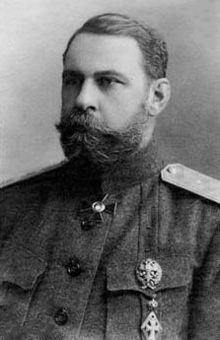Vladimir Ipatiev
| Vladimir Ipatieff | |
|---|---|
 |
|
| Born |
Vladimir Nikolayevich Ipatieff November 21, 1867 Moscow |
| Died | November 29, 1952 (aged 85) Chicago |
| Nationality | Russian American |
| Awards | Willard Gibbs Award (1940) |
| Scientific career | |
| Institutions | Northwestern University |
| Doctoral advisor | Alexei Yevgrafovich Favorskii |
Vladimir Nikolayevich Ipatieff (also Ipatiev; Russian: Владимир Николаевич Ипатьев) (November 21, 1867 (November 9 OS) – November 29, 1952) was a Russian and American chemist. His most important contributions are in the field of petroleum chemistry.
Born in Moscow, Ipatieff first studied artillery in the Mikhailovskaya Artillery Academy in Petersburg, then later studied chemistry in Russia with Alexei Yevgrafovich Favorskii and in Germany. (The prominence of the extended family is illustrated by the fact that the July 17, 1918 extermination of by then ex-Czar Nicholas Romanoff, the Empress and the rest of the royal family, their doctor and retinue actually took place in the basement of a vacation house owned by the Ipatieff family in Ekaterinburg.) His first works in chemistry were devoted to the study of metals and explosives. Later, his works on catalysis methods under high pressure made him famous as a chemist; for his reactions he used massive bombs (often called Ipatieff bomb) made of steel. With the start of World War I, Ipatieff organized a dedicated laboratory in Petersburg which made improvements to the chemical weaponry and the methods of chemical protection for the army. Before the October revolution, Ipatieff was a General-Lieutenant of the Russian army and a member of the Russian Academy of Sciences.
After the revolution and civil war, Ipatieff was active in creating and heading several important chemical research centers in Soviet Russia. Lenin called him "the head of our [Soviet] chemical industry". By the late 1920s, however, Ipatieff was starting to feel threatened because of his past in the Czarist army and because he had friends among those convicted in the Industrial Party trial. In 1930, Ipatieff, fearing that in time he would be victimized, withdrew a small amount of money from his accounts and prepared to attend an industry conference in Munich. He invited his wife to come with him, and at the last minute suggested she bring her jewels "in the event that we go dancing." As the train came to the border into Poland, he announced to his wife, "Dear, look back at Mother Russia. You will never see her again." Though he spoke not a word of English, he fled to the United States.
...
Wikipedia
